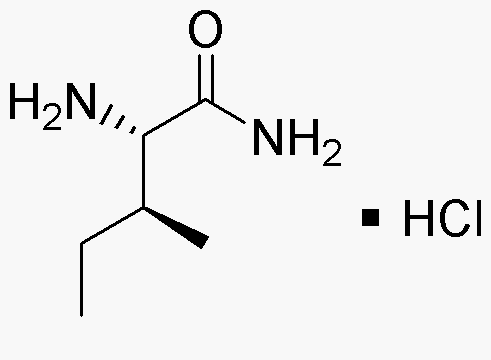L-Isoleucine amide hydrochloride is widely utilized in research focused on:
- Protein Synthesis: This compound serves as a building block for synthesizing proteins, particularly in studies involving muscle development and repair.
- Pharmaceutical Development: It is used in the formulation of medications targeting metabolic disorders, enhancing the efficacy of treatments for conditions like diabetes.
- Biochemical Research: Researchers employ it to investigate metabolic pathways and enzyme functions, providing insights into cellular processes.
- Food Industry: L-Isoleucine amide hydrochloride is explored as a supplement in nutritional products, promoting muscle recovery and overall health.
- Animal Nutrition: It is added to animal feed to improve growth rates and feed efficiency, particularly in livestock and aquaculture.
General Information
Properties
Safety and Regulations
Applications
L-Isoleucine amide hydrochloride is widely utilized in research focused on:
- Protein Synthesis: This compound serves as a building block for synthesizing proteins, particularly in studies involving muscle development and repair.
- Pharmaceutical Development: It is used in the formulation of medications targeting metabolic disorders, enhancing the efficacy of treatments for conditions like diabetes.
- Biochemical Research: Researchers employ it to investigate metabolic pathways and enzyme functions, providing insights into cellular processes.
- Food Industry: L-Isoleucine amide hydrochloride is explored as a supplement in nutritional products, promoting muscle recovery and overall health.
- Animal Nutrition: It is added to animal feed to improve growth rates and feed efficiency, particularly in livestock and aquaculture.
Documents
Safety Data Sheets (SDS)
The SDS provides comprehensive safety information on handling, storage, and disposal of the product.
Product Specification (PS)
The PS provides a comprehensive breakdown of the product’s properties, including chemical composition, physical state, purity, and storage requirements. It also details acceptable quality ranges and the product's intended applications.
Certificates of Analysis (COA)
Search for Certificates of Analysis (COA) by entering the products Lot Number. Lot and Batch Numbers can be found on a product’s label following the words ‘Lot’ or ‘Batch’.
*Catalog Number
*Lot Number
Certificates Of Origin (COO)
This COO confirms the country where the product was manufactured, and also details the materials and components used in it and whether it is derived from natural, synthetic, or other specific sources. This certificate may be required for customs, trade, and regulatory compliance.
*Catalog Number
*Lot Number
Safety Data Sheets (SDS)
The SDS provides comprehensive safety information on handling, storage, and disposal of the product.
DownloadProduct Specification (PS)
The PS provides a comprehensive breakdown of the product’s properties, including chemical composition, physical state, purity, and storage requirements. It also details acceptable quality ranges and the product's intended applications.
DownloadCertificates of Analysis (COA)
Search for Certificates of Analysis (COA) by entering the products Lot Number. Lot and Batch Numbers can be found on a product’s label following the words ‘Lot’ or ‘Batch’.
*Catalog Number
*Lot Number
Certificates Of Origin (COO)
This COO confirms the country where the product was manufactured, and also details the materials and components used in it and whether it is derived from natural, synthetic, or other specific sources. This certificate may be required for customs, trade, and regulatory compliance.


